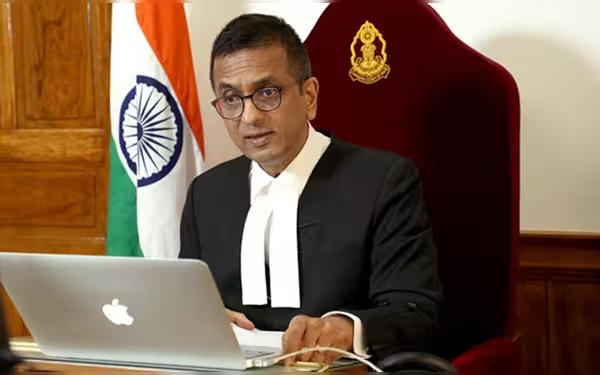Tuesday, October 29, 2024 09:21 AM
CJI Emphasizes Supreme Court's Role as People's Court
- CJI warns against viewing court's role through case outcomes.
- Supreme Court's identity as a people's court must be preserved.
- Technological advancements enhance accessibility to justice.
 Image Credits: menafn
Image Credits: menafnCJI highlights the Supreme Court's role as a people's court, emphasizing independence and accessibility amid public scrutiny.
The Chief Justice of India (CJI) recently emphasized the crucial role of the Supreme Court as a "people's court" during the inaugural Supreme Court Advocates On Record Association (SCAORA) conference held in South Goa. He articulated that while criticism of the court's legal doctrines and errors is acceptable, it is imperative to view the court's work beyond mere outcomes. This statement comes at a time when public perception of the judiciary often fluctuates based on individual case results.
The CJI pointed out that the Supreme Court has developed an "access to justice paradigm" over the past 75 years, which should not be overlooked. He stressed that the court is not merely a venue for high-profile cases but serves all citizens, regardless of their social standing. "Ours is a court which is a people's court," he stated, underscoring the importance of maintaining this identity for future generations.
In his address, the CJI made it clear that the Supreme Court should not assume the role of the opposition in Parliament. He noted a troubling trend where the court is praised when decisions favor individuals but criticized when outcomes are unfavorable. This, he warned, creates a dangerous narrative that undermines the independence of the judiciary. "You cannot look at the role of the Supreme Court or its work from the perspective of the outcomes," he cautioned.
Moreover, the CJI acknowledged the right to critique the court for inconsistencies in legal doctrine. However, he highlighted the issue that arises when public opinion shifts based solely on the direction of the court's decisions. He urged the legal profession to cultivate a robust understanding that judges must make independent decisions based on the specifics of each case.
On the topic of technological advancements, the CJI shared that the Supreme Court has made significant strides, including the introduction of e-filing, digitization of case records, and live-streaming of court proceedings. He described live-streaming as a "game-changer," allowing the court's work to reach millions of people instantly. This innovation has helped dispel the notion that the Supreme Court only addresses cases involving wealthy clients, as it now showcases the court's attention to the everyday issues faced by ordinary citizens.
The CJI's remarks serve as a reminder of the Supreme Court's vital role in upholding justice for all, not just the privileged few. As the judiciary continues to evolve, it is essential for both the public and legal professionals to recognize the importance of an independent court that prioritizes fairness and accessibility. The ongoing dialogue about the court's role in society is crucial for fostering a legal system that truly serves the people.













